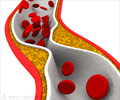High levels of ceramides in the blood indicate the risk of heart disease in those without previous blocks or elevated LDL cholesterol levels.
Highlights
- Elevated ceramide levels helps predict heart attack risk in adults with no blockages and in those with low levels of low-density lipoprotein.
- Highest levels of blood //ceramides were associated with a threefold to fourfold greater risk of suffering a cardiovascular event.
- Ceramides play an active role in the cardiovascular disease process by attracting and drawing inflammatory cells and promoting clotting.
In fact, individuals with the highest levels of blood ceramides were found to have a threefold to fourfold greater risk of suffering a cardiovascular event compared with those with the lowest ceramide score, regardless of their LDL cholesterol level or the presence of a blockage in the heart's arteries.
"Based on our findings, measuring ceramides in the blood appears to be a new, potentially better marker than LDL in predicting first and repeat cardiac events in both patients with and without established coronary blockages," said Jeff Meeusen, PhD, a clinical chemist and co-director of Cardiovascular Laboratory Medicine at Mayo Clinic, and the study's lead author.
"Heart disease remains the number one killer in the United States. Measuring ceramides offers another piece of information to help identify individuals who might need a little more attention, guide treatment decisions and keep patients motivated to [live heart healthier]."
Meeusen said that unlike cholesterol, which is fairly inert, acting like a clog in the arteries, ceramides play an active role in the cardiovascular disease process by attracting and drawing inflammatory cells and promoting clotting. All cells have the ability to make ceramides; however, ceramide levels tend to accumulate in the blood when we have too much fat or consume excess calories.
The study included 499 patients at Mayo Clinic who were referred for coronary angiography to check for possible blockages in the heart's arteries, of whom only half (46 percent) were found to have evidence of a blockage. Coronary artery disease was defined as 50 percent stenosis, or narrowing, in one or more artery.
Researchers measured four different types of ceramides in the blood at baseline and combined the values into a 12-point scale. Patients were grouped into four risk categories according to their ceramide levels: low (0-2), intermediate (3-6), moderate (7-9) and high (10-12).
Researchers prospectively followed study participants for an average of eight years and recorded occurrences of heart attack, stroke, revascularization and death. Overall, 5.1 percent of patients had a major cardiovascular event during the study timeframe.
However, the risk of having an event was progressively higher as the level of ceramides in the blood increased; for each one-point increase in the ceramide risk score, the risk rose by 9 percent--a trend that remained even after fully adjusting for other risk factors including age, sex, high blood pressure, smoking, total cholesterol, HDL and markers of inflammation.
In fact, the rate of events was double among people with the highest ceramide score compared with those with the lowest (8.1 versus 4.1 percent, respectively). Total cholesterol also increased with rising ceramide scores and males were less likely to have high levels of ceramides.
Among those without coronary artery disease upon angiography, the rate of cardiovascular events was only 3.1 percent, lower than the average overall. But when researchers examined cardiovascular disease in this population by ceramide scores, people with the highest levels of ceramides were four times more likely to have an event compared with those with the lowest (7.8 versus 2.2 percent, respectively).
A similar trend was seen among people with low LDL levels (<100 mg/dL), typically considered a good LDL target. In this group, the rate of heart attack, stroke and revascularization, and death was 3.7 percent among those with a low ceramide score but jumped to 16.4 percent in people with the highest ceramide levels.
"Ceramides continued to be significant and independently associated with disease even after adjusting for traditional and novel cardiovascular risk factors," Meeusen said. "
Those with high ceramide levels are patients who could benefit from more intensive treatment, for example: a higher-dose statin, a nutritionist consult or formal exercise therapy.
"Knowing their ceramide score can improve therapeutic compliance and patient motivation, particularly since the numbers improve within a few weeks," he said.
Additional studies are currently underway to investigate whether checking ceramides can help prevent or delay the onset of cardiovascular disease, as well as the use of therapeutic interventions, including PCSK9 inhibitors, on ceramide concentrations.
Reference
- Jeff Meeusen et al., Levels of ceramides in the blood help predict cardiovascular events, American College of Cardiology's 66th Annual Scientific Session (2017).
Source-Medindia
















